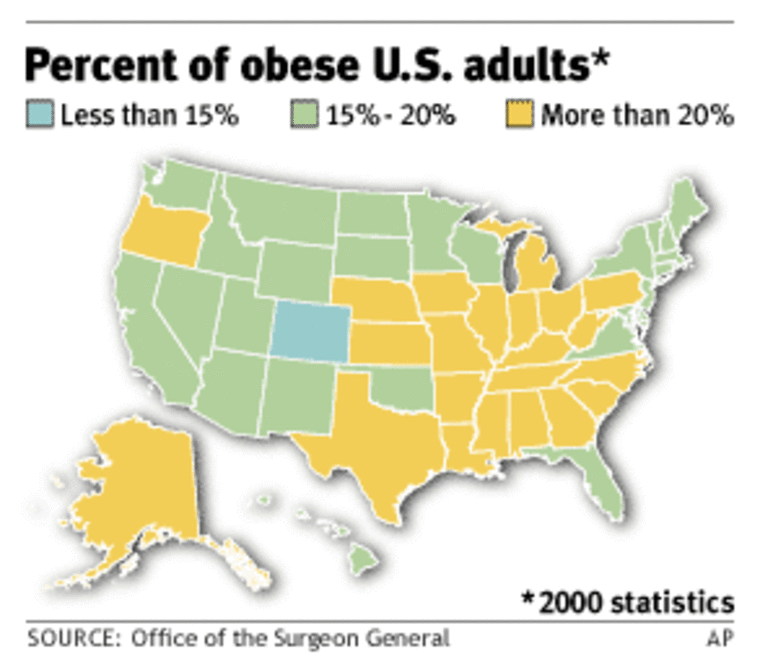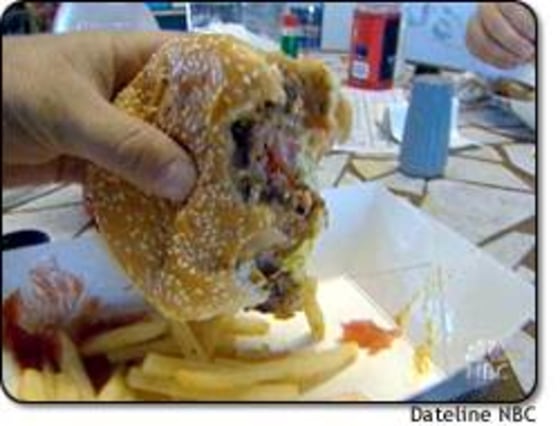If you’ve ever been on a diet, ever counted your calories, ever stepped onto a bathroom scale and dreaded the outcome — in other words if you’re breathing right now — get ready to hear it like is, from the man who tells it like it is, Dr. Phil McGraw. He’s got some provocative new ideas about why we gain weight, and how we can lose it. Food is such a rich part of our lives, and we eat everywhere, in restaurants, at home, in the office, on the road. Not just at mealtimes, but all the time. And yet, we’re constantly told that thin is in. The messages are so confusing: Weight loss ads urge us to downsize, while food commercials tell us to supersize it. Somewhere along the way, we’ve supersized ourselves into becoming the fattest nation on earth.
We've got a crisis on our hands — not to mention on our backsides, our stomachs, and our thighs. And whatever your age, whether your hips are into hip-hop or sweating to the oldies, you don’t need us to tell you. Despite all our yo-yo dieting, and desperate attempts to get in shape, we’re heavier than ever. Nearly two-thirds of American adults are overweight or obese and 30 percent of our kids have a weight problem.
In fact, we’re shimmying and bopping and waddling, to the point we’ve become the fattest nation on the planet. For decades, overweight people have been on the receiving end, from Laurel and Hardy, to “The Honeymooners,” from “The Nutty Professor,” to MTV.
But this is no laughing matter.
“Now if this was an infectious disease, SARS or something, we would put all of our resources to stopping this virus or bacteria,” says former U.S. Surgeon General David Satcher. “And we have to do the same thing here.”
In 2001, Dr. Satcher released a frightening report on our obesity crisis. Since then, the problem has only gotten worse.
“Right now, about 300,000 people a year in this country die from consequences of obesity,” says Dr. Satcher. “We project that if the trend continues as it’s going now, obesity will in fact overtake smoking as the leading preventable cause of death in this country.”
In short, some of us are literally eating ourselves into an early grave. To find out how bad the crisis is, we went to Dr. Phil McGraw’s neck of the woods: Dallas. “Big D” is bigger than ever. Of course, the folks we spoke to say bigger is not better when it comes to body size. And the women we spoke to say you might not realize just how much our weight is weighing on our minds and damaging our self esteem.
Kay Garr can’t shake the memory of childhood taunts that still echo from the 1940’s. Former fashion model Georgia Burgasser can hardly look at her old portfolio.
For many of us, our weight problem is simply a matter of vanity: We just want to look good. But if you don’t think obesity’s a life or death problem for millions of Americans, meet Tina Hove.
“I don’t need to know what I have to do,” says Tina. “I already know I’ve tried it doesn’t work. It just doesn’t work.”
For Tina, obesity is a deadly-serious condition. She feels trapped in her body, and in a vicious cycle:
“I’ve probably spent thousands of dollars on every fad diet that is out there,” says Tina.

Unfortunately, there’s nothing that unusual about Tina’s story, except she has the courage to tell it.
A medical records manager who lives near Dallas, she’s 43. She weighs about 375 pounds, and she’s been overweight since childhood.
“I’d go home from school crying most days,” says Tina. “And then my Mom would always have cakes or cookies and that was my comfort whenever somebody was teasing me.”
“The more she gained, the worse she felt about herself,” says Pat Hove, Tina’s mother. “And the more she tried to lose, the more frustrated she became.”
Tina’s obesity has now led to high blood pressure and diabetes. She has to take insulin two times a day and her mother worries all the time.
“I’ve lost many a night’s sleep over it in trying to figure out what we can do to help her,” says Pat.
And for Tina, sometimes, it’s just too much to bear.
“You’ve got people telling you if you don’t lose the weight, you’re gonna die, if you don’t take your medication you’re gonna die,” says Tina. “I mean there are times that you want to say OK, if that’s the case then let’s do it.”
The heartbreaking answer is yes, she’s even considered taking her own life.
“Sometimes you want to give up, you just want to give up,” says Tina. “And when I want to give up I call my mom and I talk to her.”
“I talk about it,” says Pat. “I listen to her and let her sound off and try to encourage her and be there.”
“She puts me back on the right track,” says Tina. “She tells me what I would be missing and that people would miss me so she gets a lot of phone calls some days some days it’s really hard. But people don’t understand how hard it is. So you just keep trying.”
So many of us are trying. But sometimes it seems like modern American society is stacked against us.
“We are a nation of fat-building,” says Lisa Dorfman, a sports nutritionist at the University of Miami. “We do a great job at making people become fat either through restaurant portion sizes or encouraging people to eat to deal with stress, or say, ‘Are you really going to sweat for an hour?’”
But the come-ons for food are everywhere, especially on TV. Who wouldn’t be shaking watching all this? We recorded just one afternoon’s worth of commercials on the NBC station in New York, and there were many ads for diet programs. They’re now a $40 billion business, but are they getting us anywhere?
Nutritionist Maggie Greenwood-Robinson was a consultant on “The Ultimate Weight Solution.”
“I think it’s important for people to realize that we are dieting our way to being overweight,” says Greenwood-Robinson. “We start a diet, we lose some weight. Then we go off the diet, we gain back weight, we gain back a little more weight. So we start another diet, and we’re back up, up, up. So, we’re climbing our way to obesity.”
But being tempted to ditch our diets is easy. We have more food, in more places, at easier reach, than anyone could have imagined even just 20 years ago. It’s everywhere we look, in gas stations, convenience stores, the office, vending machines, and even in pharmacies. You can’t get away from it. And if you’re busy — and who isn’t? — it’s easy to just do a drive-by.
At the same time, portion sizes have grown as fast as our waistlines. According to recent studies, we’ve gone from “hold the pickle, hold the lettuce” back in the 1970s, to not holding back on anything. Serving sizes for burgers, fries, and sodas in the past 25 years have grown two to five times.
“One example of course is the very popular fast food place where a few years ago french fries came in two-ounce bags,” says Dr. Satcher. “And that’s about 200 calories. But now the supersize one is over six ounces and over 600 calories.”
Another reason we’re getting supersized is that we’re much less active than we used to be.
“One of the biggest things behind the obesity epidemic is that we are under-exercising,” says Greenwood-Robinson. “We start the day as desk potatoes and we finish the day as couch potatoes. We’re just not active enough.”
Researchers say that’s especially true for kids. It seems the most exercise some are getting is sliding from the TV to the computer. And then there’s the frustration factor, courtesy of the entertainment and fashion industries.
For regular folks to try to live up to the body images of the models and actors that are out there today? Fuggedaboutit.
At the very time we’re blowing up, Hollywood and the fashion industry are telling us we should rail-thin. And for young girls, the temptation or pressure to go on diets to look like the latest pop star can be downright dangerous.
“Because it fuels the obsession to be thin,” says Greenwood-Robinson. “And that can lead to eating disorders.”
In fact, some experts suggest maybe we should just relax a bit about our eating habits. That’s because in France, where people just say oui to foods notoriously rich and high in fat, only about eight percent of the population is overweight. It’s been called the “French paradox.”
Dr. Paul Rozin, a psychologist at the University of Pennsylvania, says that the famous French love of food could reduce stress and help them stay thin and healthy.
“We’re getting fatter as we worry about getting fat, the French are not as worried about getting fat and they’re not getting fatter,” says Dr. Rozin.
Some researchers suspect smaller food portions are the main reason the French stay petit. But stress is a known factor in obesity. And the former Surgeon General says a good first step for losing weight might be to try and cut stress in our lives, along with the calories.
“It’s a problem in terms of the way we eat,” says Dr. Satcher. “It’s a problem in terms of the way we tend to feel that we don’t have time for physical activity. And it’s driving us to graves really.”
